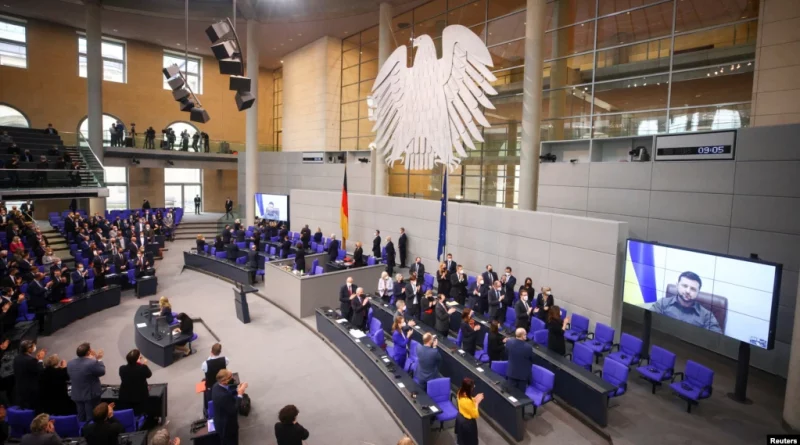Zelensky reproached Germany for creating a “wall” between Ukraine and Europe
Zelensky reproached Germany for creating a "wall" between Ukraine and Europe
Speaking Thursday via video link to members of the German parliament, Vladimir Zelensky said that for many years Germany had opted for economic benefits instead of supporting the values of freedom, and despite all warnings, continued to build Nord Stream 2. As you know, its commissioning was suspended only on February 22 after Russia recognized the self-proclaimed DNR and LNR. Thus, Germany actually helped to isolate Ukraine and build a “wall” between it and Europe, Zelensky believes.
“During the three weeks of war for our lives and our freedom we have become convinced of what we felt before, and what probably not all of you noticed – you are again behind the wall, but not the Berlin wall, but the one in the middle of Europe between freedom and unfreedom, and this wall grows with every bomb that falls on our land, with every decision that could help, but never made,” Zelensky said.
Also in his speech, the Ukrainian president mentioned the Holocaust and said its lessons are now useless. “Every year in Germany politicians say ‘never again.’ Now I see that these words are worthless. People are being destroyed in Europe,” he noted.
Zelensky reproached Germany for delaying Ukraine’s accession to NATO and the European Union, guided by its own political considerations, not imposing preventive sanctions against Russia, and those adopted in the European Union already after the Russian invasion were not enough.
Addressing German Chancellor Olaf Scholz, Zielenski called for “breaking down the wall erected between Ukraine and Europe, to demonstrate our leadership and do everything to stop the war. Zelensky’s speech was greeted with applause in the Bundestag, and Bundestag Vice-President Katrin Goering-Eckardt said that “Putin tried to deprive Ukraine of its right to exist, but has already failed.
At the same time, the number of Ukrainian refugees in Europe is growing day by day. In Germany alone, more than 147,000 Ukrainians fleeing the shelling have already been registered. Almost 2 million are in Poland, as well as a large number in Hungary, Romania, Moldova and Slovakia. In total, more than 3 million people have left Ukraine since the start of the war.
The European Union passed an act of temporary assistance to Ukrainian refugees, under which people fleeing the war are immediately entitled to residency and work. This, according to experts, is much more effective than the usual asylum procedure, when a work permit has to wait from 4 to 6 months, depending on the European country. At the same time, it is still not easy to find housing, get a job, obtain documents, and send children to school right away.
“There are a number of challenges that lawmakers should and are already paying attention to,” says Marie de Somer, head of the migration program at the European Policy Center (EPC). – First, what to do about the language barrier; second, how to recognize qualifications for work. Also, we should not forget that in this migration wave there are a lot of women and children. They are leaving the country without their husbands and partners, and this leads to an extra need for a new social system of care for children – quality services where women could leave their children and go to work. This is a whole new challenge in this context, and it has to be done to make the labor market available to Ukrainian refugees.”
One of the main humanitarian issues now being discussed in the European Council is what to do about the education of Ukrainian children fleeing the war. The main directions so far are two: create Ukrainian schools that teach children in their native language, or try to integrate Ukrainian children into the local education system by first teaching them the language spoken in the country. Lawmakers have yet to work this out. Overall, experts say it is difficult to predict what measures will be effective now, because it is unclear when the war will be over and when people will be able to return home.
